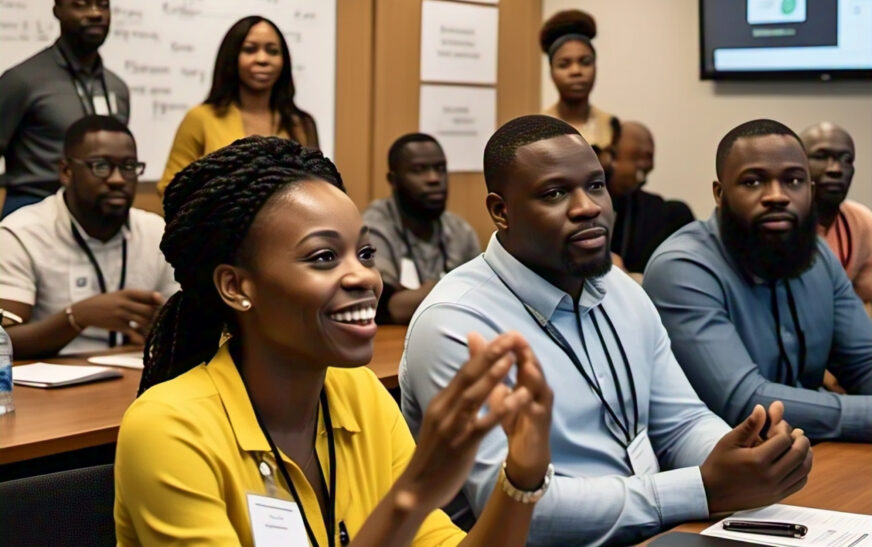Event business in Nigeria has the potential to grow rapidly and above its current worth of about 20 billion dollars if the right data is properly harnessed and deployed indigenously. It’s current growth can be attributed to an increase in urbanisation, social, cultural and economic trends, as well as some successes in internet penetration in some parts of the country.
If event professionals in Nigeria continue to ignore this critical issue, other developed nations and entities will mine our own data for us and will require us to pay through the nose or other biting means to get our own data, which may hamper progress in the event business in Nigeria.
It is impossible to overstate the importance of leveraging data in today’s business environment and the event business in Nigeria; it is the fundamental basis for problem-solving, developing scaling strategies, and suggesting and projecting the company’s future. Data has critical answers to major and current challenges that may be faced by the industry in Nigeria.
In this issue, we will examine the power of data in turning the potentials of event business in Nigeria into one that will generate more employment for the country, increase GDP and ultimately compete favourably with its contemporaries in other countries.
Before we go any further, though, let’s clarify what data means to an event manager.
What does “data” mean to an event manager?
To an event manager in the event business in Nigeria , data can be described as that essential information collected in an event about the attendees or any other subject agreed upon as a result of interactions with the event management processes, procedures and tools.
In other words, data is that information that is deliberately collected from;
The pre-event planning phase,
Examples are attendee insights, information and analysis from social media and marketing efforts, and historical data from previous events or other similar events of others.
During the main event,
Examples are attendee tracking, measurement of guest engagement, and other operational efficienc
The post-event phase,
Examples are measurement of profits or return on investment ROI, percentage of attainment of set goals, feedback and responses on agreed metrics.
The Growing Opportunities in the Event Business in Nigeria
The sustainability and success of their events are two of the main reasons Nigerian event managers need to work with data.
In addition, the growing population of over 200 million people is an added advantage because it provides more opportunities. However, changing times are impacting critically on attendee’s preferences and interests. Hence the need to use data for designing the best and most experientially viable event and for better ROI.
Data collection also helps in establishing reasonable spending plans, monitoring expenditures, luring partners and sponsors, adhering to legal requirements, and assessing the success of an event. Enhancing event marketing strategies for the event business in Nigeria, bettering the event experience for attendees, and comprehending the Nigerian event management market are possible additional reasons.
Proven ways of collecting data in the event business in Nigeria
It is crucial to remember that event management organisations are distinct and going through various stages of development at this point. Essentially, depending on their various growth levels and event objectives, one will seek a completely different type of data.
It means that event managers must be deliberate in choosing the most important data that is needed to avoid duplicity and other data breaches.
Here are the proven ways to collect data
Surveys and Feedback Forms: You can use this online or offline to gather feedback from attendees. Instead of using paper due to sustainability concerns, use a digital device to collect various data.
Social Media Engagement: You can use social media alongside hashtags to capture conversations about the event. There are third-party apps as well as Facebook. instagram, X formerly Twitter, TikTok, etc whose inbuilt analytics can help provide sufficient metrics
Registration/Ticketing Systems: The opportunity to register attendees is a huge chance to collect various data, such as the attendee’s identity and other demographics that are essential to taking certain decisions.
Email Marketing Campaigns: This tool helps you to increase engagement with your attendees and track their comments and concerns. You can track and grow their engagement with email campaigns using email apps or software.
QR Codes: QR codes are codes that are readable by machines. They store lots of information that your attendees can interact with by subscribing to or reading information.
Simple tools for collecting data as an event manager
The choice of these data collection tools is subject to the type of data that is desired, available time, budget and technical knowledge available for the project.
However, here are some simple data collection tools
Google Forms: A Google Form is an online document for creating online surveys and forms that can be shared via email or social media. You attendees can interact with this document when they are served.
Survey Monkey One well-known online tool for making, sharing, and collecting surveys and feedback is SurveyMonkey. They are served to the attendees during or after the event for the desired response.
QR Code Generators: QR code generators allow you to create QR codes for on-site data collection.
Apps for events: You can create your own app that will allow you to own your data; if not, you may choose to use other third-party apps that offer full event management solutions, including data collection capabilities, at a cost.
Data Analytics Tools: Platforms like Google Analytics can help track website traffic related to the event.
Local Event Management Platforms: Consider using local platforms or software tailored to the Nigerian market for event management and data collection.
How to turn data into actionable ideas and recommendations
Now, it is important to understand that the collected data may remain useless or redundant until they are turned into workable ideas. A number of procedures must be followed in order to convert raw data into valuable information that can guide decision-making.
To effectively use data for your objectives, follow these steps:
Define your goals and set KPIs:
Clearly state and identify the reason why you gathered the data in the first place. This could be raising revenue, improving attendee experience, or increasing event attendance. Your KPIs (Key Performance Index) are the specific measuring quality you have chosen to use in measuring the result you desire.
Collect relevant data
Using the right tools, like we enumerated above, ensure you collect the specific data that aligns with the KPIs in order to get the accurate result.
Verify the collected data
Take this step to recheck the data you have collected to ensure that they are really what you have set out to get.
Analyse the data using tools that you understand well
Begin to analyse the data by identifying trends and patterns related to the KPIs you have set initially. I recommend that you get the services of a data analyst to help analyse and interpret the data based on your objectives and consider external factors.
Implement the changes by developing an action plan and monitoring progress
The next step is to create actionable conclusions by translating the findings into working recommendations. You must ensure to put into quick action these recommendations for growth to occur.
To continuously improve, review and adjust the strategies in light of fresh information and results.
In conclusion, it is necessary to understand this process may never yield results in a few days, but a continuous engagement of the processes will surely produce a successful result. Event business in Nigeria hs the potential to triples its growth if data is used as a major ingredient.










